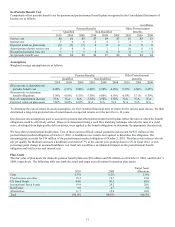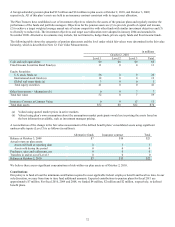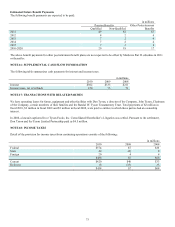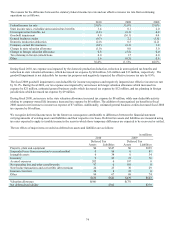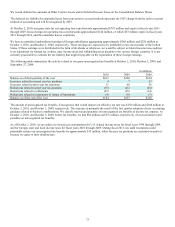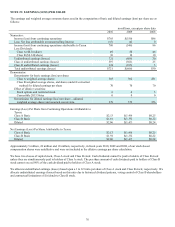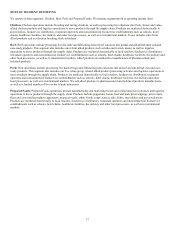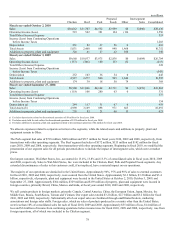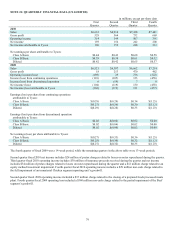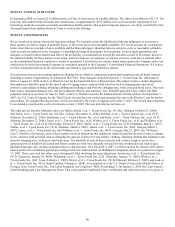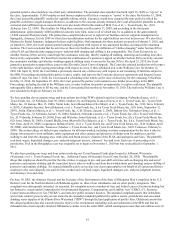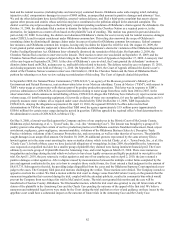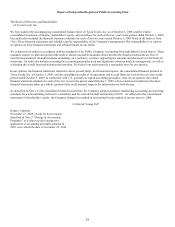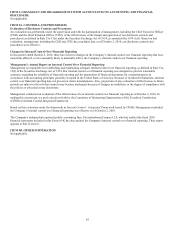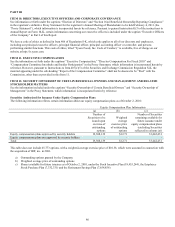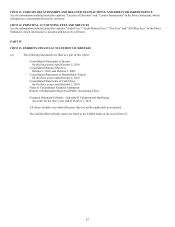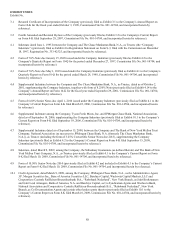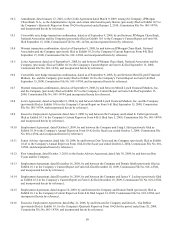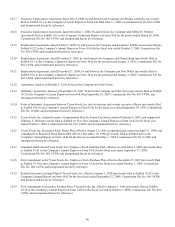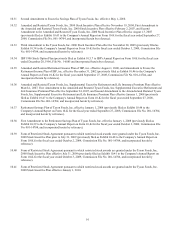Tyson Foods 2010 Annual Report Download - page 81
Download and view the complete annual report
Please find page 81 of the 2010 Tyson Foods annual report below. You can navigate through the pages in the report by either clicking on the pages listed below, or by using the keyword search tool below to find specific information within the annual report.81
potential putative class members via a third party administrator. The potential class members had until April 18, 2008, to “opt–in” to
the class. Approximately 13,800 employees and former employees filed their consents to “opt-in” to the class. On October 15, 2008,
the Court denied the plaintiffs’ motion for equitable tolling, which, if granted, would have extended the time period in which the
plaintiffs could have sought damages. However, in addition to the consents already obtained, the Court allowed the plaintiffs to obtain
corrected and reaffirmed opt-in consents that were previously filed in the matter of M.H. Fox, et al. v. Tyson Foods, Inc. (N.D.
Alabama, June 22, 1999). The deadline for filing these consents was December 31, 2008, and according to the third party
administrator, approximately 4,000 reaffirmed consents were filed, some or all of which may be in addition to the approximately
13,800 consents filed previously. The parties have completed discovery at eight of our facilities and our corporate headquarters in
Springdale, Arkansas. In July 2009 we filed class decertification motions for the eight facilities involved in discovery. We also filed
Motions for Partial Summary Judgment for these eight facilities. Oral arguments for these motions occurred on February 3, 2010, and,
on March 16, 2010, the Court granted partial summary judgment with respect to two unionized facilities and denied the remaining
motions. The Court concluded that the activities at these two facilities met the definition of “clothes changing” under Section 203(o)
of the FLSA and that the time engaged in pre- and post-shift donning and doffing is not compensable. The Court did not rule on
whether Section 203(o) activity could begin the continuous work day, thereby making all walking, sanitizing and washing time after
that activity compensable. We then filed a motion for certification of a permissive appeal on whether Section 203(o) activity can start
the continuous workday and whether washing required clothing items is covered by Section 203(o). On April 23, 2010, the Court
granted us permission to appeal these issues to the Eleventh Circuit Court of Appeals. The Court also retained jurisdiction with respect
to the eight facilities while staying proceedings with respect to seven. It then scheduled trial in the Williams Case for October 12,
2010. On April 16, 2010, the Court lifted a previously entered stay of discovery with respect to our remaining 32 facilities subject to
the MDL Proceedings and ordered the parties to meet, confer, and report to the Court any discovery agreements and disputed issues
within 45 days. On June 7, 2010, the Court issued a scheduling order which set the close of discovery for the remaining 32 facilities
for May 31, 2012. On September 22, 2010, the Court granted the parties’ joint motion to stay further proceedings in the MDL
Proceedings, including the trial in the Williams case, in order to allow the parties an opportunity to explore settlement. The plaintiffs
subsequently filed a motion to lift the stay, and the Court granted this motion on November 15, 2010. The trial in the Williams Case is
now scheduled to begin on February 14, 2011.
We have pending eleven separate wage and hour actions involving TFM’s plants located in Lexington, Nebraska (Lopez, et al. v.
Tyson Foods, Inc., D. Nebraska, June 30, 2006), Garden City and Emporia, Kansas (Garcia, et al. v. Tyson Foods, Inc., Tyson Fresh
Meats, Inc., D. Kansas, May 15, 2006), Storm Lake, Iowa (Bouaphakeo (f/k/a Sharp), et al. v. Tyson Foods, Inc., N.D. Iowa, February
6, 2007), Columbus Junction, Iowa (Robinson, et al. v. Tyson Foods, Inc., d.b.a Tyson Fresh Meats, Inc., S.D. Iowa, September 12,
2007), Joslin, Illinois (Murray, et al. v. Tyson Foods, Inc., C.D. Illinois, January 2, 2008), Dakota City, Nebraska (Gomez, et al. v.
Tyson Foods, Inc., D. Nebraska, January 16, 2008), Madison, Nebraska (Acosta, et al. v Tyson Foods, Inc. d.b.a Tyson Fresh Meats,
Inc., D. Nebraska, February 29, 2008), Perry and Waterloo, Iowa (Edwards, et al. v. Tyson Foods, Inc. d.b.a Tyson Fresh Meats, Inc.,
S.D. Iowa, March 20, 2008); Council Bluffs, Iowa (Maxwell (f/k/a Salazar), et al. v. Tyson Foods, Inc. d.b.a. Tyson Fresh Meats, Inc.,
S.D. Iowa, April 29, 2008); Logansport, Indiana (Carter, et al. v. Tyson Foods, Inc. and Tyson Fresh Meats, Inc., N.D. Indiana, April
29, 2008); and Goodlettsville, Tennessee (Abadeer v. Tyson Foods, Inc., and Tyson Fresh Meats, Inc., M.D. Tennessee, February 6,
2009). The actions allege we failed to pay employees for all hours worked, including overtime compensation for the time it takes to
change into protective work uniforms, safety equipment and other sanitary and protective clothing worn by employees, and for
walking to and from the changing area, work areas and break areas in violation of the FLSA and analogous state laws. The plaintiffs
seek back wages, liquidated damages, pre- and post-judgment interest, attorneys’ fees and costs. Each case is proceeding in its
jurisdiction. Trial in the Bouaphakeo case was originally set to begin on November 1, 2010 but was rescheduled for September 7,
2011.
We also have pending one wage and hour action involving our Tyson Prepared Foods plant located in Jefferson, Wisconsin
(Weissman, et al. v. Tyson Prepared Foods, Inc., (Jefferson County (Wisconsin) Circuit Court, October 20, 2010) The plaintiffs
allege that employees should be paid for the time it takes to engage in pre- and post-shift activities such as changing into and out of
protective and sanitary clothing and the associated time it takes to walk to and from their workstations post-donning and pre-doffing of
protective and sanitary clothing. Six named plaintiffs seek to act as state law class representatives on behalf of all current and former
employees who were allegedly not paid for time worked and seek back wages, liquidated damages, pre- and post-judgment interest,
and attorneys’ fees and costs.
On June 19, 2005, the Attorney General and the Secretary of the Environment of the State of Oklahoma filed a complaint in the U.S.
District Court for the Northern District of Oklahoma against us, three of our subsidiaries and six other poultry integrators. This
complaint was subsequently amended. As amended, the complaint asserts a number of state and federal causes of action including, but
not limited to, counts under Comprehensive Environmental Response, Compensation, and Liability Act (“CERCLA”), Resource
Conservation and Recovery Act (“RCRA”), and state-law public nuisance theories. The amended complaint asserts that defendants
and certain contract growers who are not named in the amended complaint polluted the surface waters, groundwater and associated
drinking water supplies of the Illinois River Watershed (“IRW”) through the land application of poultry litter. Oklahoma asserts that
this alleged pollution has also caused extensive injury to the environment (including soils and sediments) of the IRW and that the
defendants have been unjustly enriched. Oklahoma’s claims cover the entire IRW, which encompasses more than one million acres of


